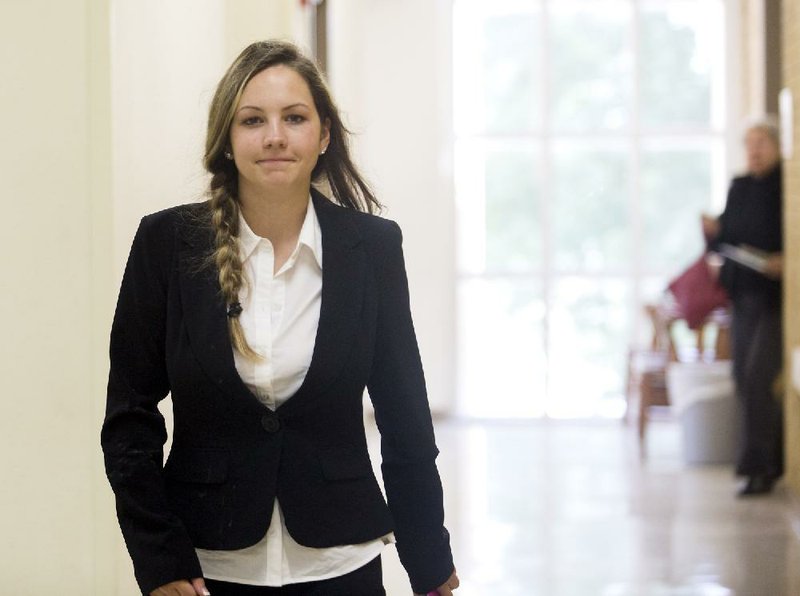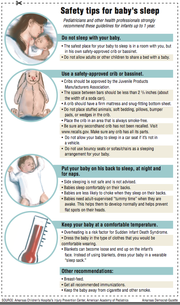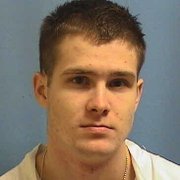Second in a series
Six-month-old Andrew Moss died Jan. 25, 2015, while sleeping between parents who loved to cuddle with him.
By everyone's account, Austin Moss, then 21, and Jennifer Moss, 19, didn't intend to hurt their baby.
But the Siloam Springs couple smoked marijuana earlier that night. And while all three slept on two pushed-together love seats, Andrew died of asphyxiation.
Now the parents are serving prison sentences for manslaughter.
Jennifer Moss' trial and the couple's guilty pleas unfolded last July in a Bentonville courtroom -- a rare prosecution in Arkansas of parents who lost an infant that was placed in a dangerous sleeping situation.
Prosecuting attorneys in other states have filed criminal charges in similar cases.
In five such cases reviewed by the Arkansas Democrat-Gazette, infants died while sleeping with parents in adult beds or on their stomachs on soft bedding. These conditions raise the risk of asphyxiation and sudden death.
Most of the parents also had abused alcohol or drugs, as in the Moss case, or had lost children previously in unsafe sleeping surroundings and should have known the risks.
[DEAD ASLEEP: Babies at Risk » Full coverage + tips for safe sleep, interactive quiz, more]
The court cases show that placing an infant in a risky sleeping situation can raise the question of criminal negligence.
It's much the same, prosecutors say, as when a caregiver forgets a baby in a hot car.
Whether in a hot car or in a dangerous bed, such deaths are tragedies, and under certain circumstances, the parents or caretakers can face criminal charges as a result.
Since 2011, prosecutors have filed charges in infant sleep deaths in Missouri, North Carolina, Pennsylvania, Utah and Virginia, among other states.
Then there's Arkansas' Moss case.
"Both of them were kids. They weren't really mature enough to take care of themselves," said John VanWinkle, Austin Moss' defense attorney, about the now-divorced Bentonville couple.
"They liked cuddling with the baby. They were sleeping on two love seats pushed together. And they did drugs the night before. It was an incredibly stupid, immature thing to do."
Baby beds, bassinets and cribs exist to protect infants from such tragedies, VanWinkle told both Mosses after Andrew died.
"They're made for your baby to sleep separately -- for this very reason," he said.
Arkansas has one of the nation's highest rates of infants who die unexpectedly in their sleep, according to the U.S. Centers for Disease Control and Prevention. The state lost more than 1,000 apparently healthy infants between 1999 and 2015.
An Arkansas Democrat-Gazette review of 102 cases between 2010 and 2016 found that 93 of those babies were sleeping in conditions that increased their chances of dying.
Among the risks, according to researchers, are: infants sleeping on their stomachs or sides, on adult beds or upholstered furniture, or with pillows, blankets or other soft bedding, or sleeping with adults or other children.
Another risk that turned up less frequently in the newspaper's analysis was caregivers who ingest alcohol or drugs that cloud their judgment or their ability to rouse from sleep.
Coroners noted in four of the 102 cases that parents had taken drugs or alcohol before their babies' deaths. Only one, besides the Moss case, involved a parent taking illegal drugs.

Full coverage + online extras
Day 3:
- Stopping killer of babies takes money; how Arkansas, others try to curb sleep deaths
- How babies die sleeping: Details from a few cases
Day 2:
- Parents can face charges; unsafe sleep deaths sometimes a crime
- How babies die sleeping: Details from a few cases
Day 1:
Benton County Prosecuting Attorney Nathan Smith said the Mosses' drug use made the decision to prosecute "not that difficult to call."
"These are people who had taken illegal drugs and impaired their abilities to care for their child and went ahead co-sleeping with their child," Smith said.
If drugs hadn't been involved, Smith said, he would have had a harder decision to make. Not every accidental child death is a crime, Smith said.
"I could envision cases where there's co-sleeping, where we would not prosecute," he said.
One example he cited was parents working long hours, who were not impaired on alcohol or illegal drugs, who didn't know the risks of sleeping with their baby, and who fell asleep in exhaustion alongside the child.
And there could be "a co-sleeping case without the drug use that would justify charges," Smith said.
He could envision charging parents who knew the risks of unsafe sleeping -- who had lost another baby in a sleep death but placed a second baby in danger anyway.
"That would be a very rare occurrence," he added.
Benton County Chief Deputy Prosecuting Attorney Stuart Cearley and Smith compared the decision-making in infant sleep death cases with deaths of babies left unattended in hot cars.
Hot-car and infant sleep deaths are almost always accidental, Cearley said.
But even after prosecutors rule out intent, they still have to decide if parents or caregivers showed criminal negligence by placing young children in danger.
'In unsafe conditions'
The Mosses had used methamphetamine and had been awake for several days before their baby died, Austin Moss told the jury in Jennifer's trial. The day of Andrew's death, mother and father had smoked marijuana to sleep, he said.
Austin Moss pleaded guilty to manslaughter on July 13 and agreed to testify against his former wife. Her case went to trial later that month. She did not testify.
The couple slept with Andrew because they wanted to be close to him, Austin Moss told the jury.
He acknowledged that their pediatrician had warned that co-sleeping is dangerous for infants, according to news accounts, and interviews with the prosecutor and defense attorneys.
The couple lived with another woman, Shay Estep, who testified that she heard the baby crying that night. She took him from the sleeping parents, fed him, changed his diaper, then put him back down to sleep on top of the father.
Austin Moss said he awoke to find his son lying face up under his left armpit. The baby's lips were blue, he said.
The father began screaming, according to a Siloam Springs police report.
The Arkansas medical examiner's office ruled that Andrew Moss died of "asphyxia in unsafe sleeping conditions." The manner -- whether the death was natural -- was labeled "accident."
Jurors found Jennifer Moss guilty of child endangerment and recommended six years in prison. The jury could not agree on a separate manslaughter charge.
Later the same day as the jury's split verdict, July 20, Jennifer Moss pleaded guilty to manslaughter. She was sentenced to six years in prison on each count. Benton County Circuit Judge Robin Green allowed her to serve the sentences concurrently.
On Aug. 4, Green sentenced Austin Moss to five years in prison.
Smith and Cearley said they aren't sure why that case is among the first to be prosecuted in Arkansas involving co-sleeping.
The same set of facts in a case can be treated differently by different prosecutors, Smith acknowledged.
"But I don't think Austin and Jennifer Moss would be treated differently," he said. "I think they would be charged 100 of 100 times."
The one other Arkansas infant sleep death in the Democrat-Gazette's review that involved a parent taking illegal drugs and a child in unsafe sleep surroundings was not prosecuted, according to court records.
North Little Rock police investigated the 2014 death but never brought it to the attention of Pulaski County Prosecuting Attorney Larry Jegley.
'Everybody's problem'
Arkansas, like other states, has no law that bans parents from sleeping with their babies or placing infants on their stomachs to sleep.
But manslaughter and child endangerment charges, both felonies, can apply in any case that occurs because of negligent or reckless actions.
Among cases prosecuted in other states in recent years, according to news accounts and court records were:
• A North Carolina woman, who in June received a 10- to 21-months suspended sentence. She lost two infants -- in 2012 and 2013 -- in questionable sleep surroundings. Katherine Jennings was co-sleeping with the babies and had a history of alcohol abuse. Medical examiners concluded that both babies suffocated.
• A Virginia woman, who pleaded guilty in 2015 to involuntary manslaughter and child neglect in the death of her 4-month-old. Testimony showed that Candice Semidey fed and swaddled her baby, then placed him facedown on a makeshift bed of a chair cushion and blanket. Semidey went to sleep. Her baby died of suffocation. A judge gave the mother a five-year suspended sentence.
• A Missouri woman, charged with involuntary manslaughter in the December 2016 suffocation of her 3-month-old son. Arizona Sallee, 21, was under the influence of methamphetamine, marijuana and Xanax while sleeping with the infant, drug test records showed. She's awaiting trial.
Prosecutions of parents whose children die in unsafe sleep conditions are controversial.
"Safe sleep is everybody's business. We try to make it about the parents. We're always eager to pin it on the parents. The indictment is of our society and our culture," said Suzanne Bronheim, a Georgetown University pediatric psychology professor.
"That we have young families who don't have places to live or access to drug treatment, and are so stressed they turn to drugs -- that's everybody's problem."
First Candle, a national group that helps support and educate families whose children died of sudden infant sleep causes, says many people make choices -- such as driving while distracted -- that may be unsafe and even deadly.
"While all could produce tragic consequences, none of these most likely would have been done with willful intent to harm their child," First Candle CEO Alison Jacobson wrote in an email. "It is our goal at First Candle to continue to educate parents and caregivers in the most optimal way to place their baby to sleep."
David LaBahn, president and chief executive of the national Association of Prosecuting Attorneys in Washington, said he's seen accidental infant sleep death cases taken to court, although rarely, over the past 30 years.
Prosecutors have to look at the facts in each case, he said.
"Was it a suffocation or a true SIDS (unexplained Sudden Infant Death Syndrome) case? Were they co-sleeping, with alcohol and drugs involved? Was there social services involvement and warnings and concern" before the baby's death? LaBahn said in an interview.
He understands that parents who lose infants attributed to unsafe sleeping conditions usually don't intend to hurt their babies.
"But from the prosecutor perspective," he said, "if they cared about and loved the baby, why were they doing drugs and sleeping with the baby in a position where it could suffocate?"
TUESDAY: Reducing Arkansas' high infant sleep death rate won't be easy, but other places provide examples for how to do it.
SundayMonday on 01/30/2017


